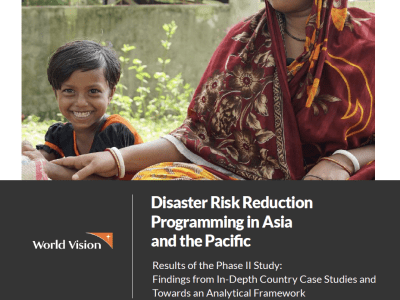publication / February 5, 2025
Strengthening the quality and accountability of emergency response - Executive summary
World Vision's 2021 plan enhances response quality in Ukraine, Moldova, Sudan, and Somalia, focusing on learning, stewardship, inclusion, localisation, and programming.
publication / February 18, 2025
World Vision Zimbabwe 2024 Annual Report
World Vision Zimbabwe 2024 Annual Report
publication / February 18, 2025
School Meals Report Card #1
World Vision School Meals Report Card #1
publication / January 27, 2025
Phase II Study: Disaster Risk Reduction Programming in Asia and the Pacific
Disaster Risk Reduction Programming in Asia and the Pacific
article / February 7, 2025
DR Congo: Success Of Community Collaboration With School Feeding Program Partners In Kasai
This article shows how World Vision's collaboration with the local community in Kasai has enabled the school canteen approach to be implemented despite the challenges facing the school feeding programme. The resilience of the local people and their personal efforts have enabled the programme to obtain support not only in terms of land for farming but also the tools needed to ensure that the children eat without interruption.
article / February 5, 2025
DR Congo: From Malnutrition To Abundance: The Impact Of World Vision's Childhood Rescue Program
This article presents the results achieved through the implementation of the CHR project in Binza, located in the Rutshuru territory of North Kivu. Faced with major challenges such as malnutrition, 4,500 children have been treated and healed thanks to the support of World Vision. At the same time, women received training and agricultural support, enabling them to become self-sufficient and meet the needs of their families.
press release / February 19, 2025
International Mother Language Day 2025: World Vision Ghana Highlights the Need for Inclusive Language Policies
World Vision Ghana joins the global community in commemorating International Mother Language Day 2025 under the theme "Silver Jubilee Celebration of International Mother Language Day."





